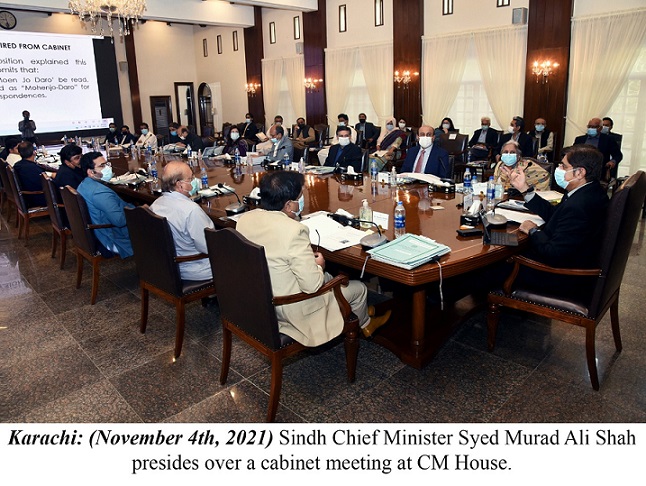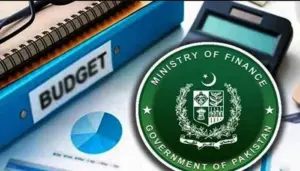Sindh cabinet fixes sugarcane price at Rs250 per 40 kg

Sindh cabinet fixes sugarcane price at Rs250 per 40 kg
– College education allowed to appoint 1500 lecturers
- Waste to Energy policy approved
- Board of Revenue to start e-stamping from December
KARACHI Nov 4,2021
The Sindh cabinet held under the chairmanship of Sindh Chief Minister Syed Murad Ali Shah here at CM House on Thursday took important decisions such as fixation of sugarcane price, appointment of 1500 subject specialists and approval of waste-to-energy policy.
The meeting was attended by provincial ministers, advisors to CM, Special assistants, chief secretary Mumtaz Shah and other concerned officers.
Sugarcane price: CM Advisor on Agriculture Manzoor Wassan told the meeting that the government regulates the supply of sugarcane for use in factories and purchase price. He added that in 2018-19 support price was fixed at Rs182 per 40 kg, in 2019-20 at Rs192 and in 2020-19 at Rs202. During all the said three seasons the crushing had started on November 30.
The cabinet was told that under the law the occupier of the sugar mill has to pay quality premium at the end of the crushing season. The cabinet considered different factors, including consultation with the growers and the miller and approved to start crushing season by November 15.
The cabinet after thorough discussions and deliberations decided to fix the price of sugar cane at Rs250 per 40 kg and premium at Rs.0.50 per 40 kg. The reason to increase the support price was the result of overall increase in prices of agricultural inputs.
Wheat
Manzoor Wassan told the cabinet that the wheat price for the season 2018-19 and 2019-20 was fixed at Rs13,000 and Rs1400 per 40 kg. He added that the price in 2021-22 was fixed at 18,00 per 40 kg by the federal government but the Sindh government in order to encourage more cultivation fixed the price at Rs2000 per 40 kg.
The meeting was told that the cost of wheat production per acre for harvesting season, 2021-22 has been estimated at Rs2000 per 40 kg on average yield of 34 maunds per acre. The recovery from sale of bhoosa was estimated at Rs250 per 40 kg, therefore net cost of production would be Rs1750 per 40 kg. The agriculture dept suggested to keep the same support price at Rs2000 per 40 kg.
The chief minister directed the agriculture department to consult other provinces for fixation of wheat prices and then bring the proposal to the cabinet.
Subject Specialist recruitment:
Minister Education Syed Sardar Shah told the cabinet that the college education department was facing two types of acute shortages of teaching staff. They include non- availability of teaching staff in particular subject in many colleges and general shortages in rural areas due to different reasons, the minister said and added they include `non filling of 20 percent seats through SPSC, reserved for direct induction in grades BPS-18, 19, 20, as per the recruitment rules; usual lengthy process of recruitment of / through SPSC; general tendency of transfer from rural to urban, near to home, administrative posts, deputations etc and general exit from service due to retirements, resignations, deaths etc.
According to the college education dept there were 11311 sanctioned posts of lecturers from grade BS-17 to BS-20 against which 7699 are working and 2676 position are vacant, of them 20 percent or 914 are to be filled through direct induction and 3590 are clear vacancies and have to be filled to make the colleges functioning properly.
Sardar Shah, sharing the vacancy position, said that there were 65 vacancies of English teacher/lecturer, 90 Urdu, 40 chemistry, 36 physics, 70 Botany, 69 Zoology, 177 Pakistan Studies and 134 Islamic studies.
He said that just to test the acute shortage of teaching staff in various colleges, especially in the far-flung areas of the province, the policy of College Teaching Intern (CTI) would be feasible to fill the existing gap by selecting competent and meritorious candidates.
The cabinet after detailed discussion approved appointment of 1500 college, district-specific, non-transferable `subject specialists/teachers’ at a monthly stipend of Rs60,000 per month for seven months under College Teaching Interns Programme 2021.
Waste to Energy policy
Minister Energy Imtiaz Shaikh presenting draft `Waste to energy policy said that Karachi, with a population of more than 20 million that specific production of waste was 0.59 kg/capita/day which meant total 10,000 – 11,000 tons of waste per day. He added Karachi alone generated more than 10,000 tons of Garbage per Day, Hyderabad being second Largest City of Province generates 1000-1100 tons, Sukkur 400 tons and Larkana 325 tons.
Minister Energy said that the Waste has Potential of Generating energy resources such as Waste to electricity generation, Waste to RDF (Refuse Derived Fuel), Waste to Gasification, Waste to Composting (Manure) and Incineration for industrial Heat steam Generation
The energy board has authority to grant permission for Power generation from the solid waste, minister Energy said and added in the first phase Initially policy would be implemented in Karachi with 50 MW parcels of projects. In phase-II the policy would be extended to the whole of Sindh for development of waste to energy projects.
Under the policy project developers will be allowed to set up power plants using Municipal Solid Waste 9MSW) for captive use, sale of electricity to KE/HESCO/SEPCO.Project developers will obtain power purchase consent from the respective buyer.
Municipal Solid waste would be provided to Waste to Energy Projects located in or in proximity of designated landfill sites free of cost by SSWMB / municipal agency concerned. The Project developer intending to transport waste from GTS to the project site will be facilitated by the SSWMB with a tipping fee equivalent to 75 percent of existing expenditure being incurred for transportation of waste from GTS to Landfill site.
The cabinet approved the policy.
Spelling correction
Minister Culture Syed Sardar Shah giving historical background said that it was Mohen Jo Daro not Mohenjo Daro. He added that Mohen Jo daro was excavated by Mr RD Banerji in1922 and two years later a major excavation of Harppa in 1920.
In 1942, it was officially reported in the annual report of Archaeological survey of India by Sir John Marshall. He showed some historical documents in which Arthur Probasthain and John Marshall have written the name as Mohen Jo Daro. He requested the cabinet to approve ambiguity in the spelling of Mohen Jo Daro.
The chief minister constituted a committee comprising Dr Azra Fazal Pehuho, Syed Sardar Shah, Ismail Rahu and Murtaza Wahab to consult with the expert and then bring the matter to the cabinet.
Land to KE
The minister Energy told the cabinet that the KE has requested for an allotment of 40 acre land in Deh Lal Bakhar, district Kiamari for establishment of a grid station. The cabinet constituted a committee comprising Imtiaz Shaikh, Nasir Shah, Saeed Ghani to examine the request and submit their report.
e-stamp system
The provincial cabinet directed the Board of Revenue to start e-stamping from December 2021. The Sindh Board of Revenue has signed a Service level Agreement (SLA) in agreement with the Punjab Information Technology Board (PITB) for launching an e-stamp system. The cabinet also amended the Stamp Act to provide legal cover to the e-stamp system.





